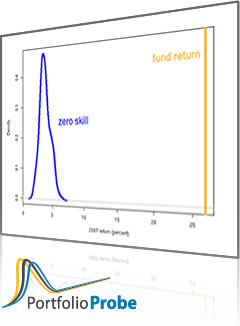Follow us using:
Newsletter Sign-up
Monthly Archives: August 2011
A critique of financial advice
Dan Ariely has a post called “Asking the right and wrong questions” about financial advisors. It starts off with: For the most part, professional financial services rely on clients’ answers to two questions: How much of your current salary will you need in retirement? What is your risk attitude on a seven-point scale? In his … Continue reading
Posted in Fund management in general
Leave a comment
Realized beta and beta equal 1
What does beta look like in the out-of-sample period for the portfolios generated to have beta equal to 1? In the comments Ian Priest wonders if the results in “The effect of beta equal 1” are due to a shift in beta from the estimation period to the out-of-sample period. (The current post will make … Continue reading
Posted in Quant finance, R language
Tagged beta equal 1, beta in finance, Capital Asset Pricing Model, CAPM
2 Comments
Market efficiency versus stability
Mark Buchanan has a piece on Bloomberg called “Sand in the machine the key to stable markets”. This is an introduction into the idea that market efficiency is at odds with market stability. A couple of quotes: Every modern economy depends on financial markets … to funnel capital into the most worthwhile enterprises. But we … Continue reading
The effect of beta equal 1
Investment Performance Guy had a post about beta equal 1. It made me wonder about the properties of portfolios with beta equal 1. When I looked, I got a bigger answer than I expected. Data I have some S&P 500 data lying about from the post ‘On “Stock correlation has been rising”‘. So laziness dictated … Continue reading
Posted in Quant finance, R language, Random portfolios
Tagged beta equal 1, beta in finance, Capital Asset Pricing Model, CAPM
12 Comments
Things I learned at useR!2011
The title says “things” but conferences are mainly about people. Some of it can be serendipitous. For example, one day I sat next to Jonathan Rougier at lunch because I had a question for him about climate models. When Jonathan left, I started a conversation with the person on my other side. That was most … Continue reading
A test of new market circuit breakers
The Barron’s article “Hitting the Switch on New Circuit Breakers” describes a backtest of the proposed new rules for circuit breakers in American markets. All trades for 2008 through 2010 were inspected relative to the so-called “limit up-limit down” scheme. Result: Maybe we should think a little more about it. Subscribe to the Portfolio Probe … Continue reading
Random input software testing
The usual approach to testing software is to create a specific problem and see if the software gets the correct answer. Although this is very useful, there are problems with it: It is labor-intensive It almost totally neglects to test the code that throws errors There can be unconscious bias in the test cases created … Continue reading
A view of useR!2011
Start Brian Ripley The conference was opened with a talk by Brian Ripley. I’ll distort his talk into 3 points that came across to me. 1. R Core is finite The time available from R Core members is a strictly limited good. The more that is pushed onto R Core, the less attention to details. … Continue reading
Twisted valuation
100 years ago today a small, rather obscure masterpiece was stolen from the Louvre by a disillusioned former(?) employee. Subsequently: the painting was recovered during an attempt to sell it to an Italian museum the painting toured Italy a campaign started in Italy to keep the painting a campaign started in France to get it … Continue reading
Posted in Fund management in general
Leave a comment
Statistical construction error
Yes, the title is meant to have two readings. The effect The Numbers Guy, among other examples, talks about the UK Office for National Statistics needing to revise its estimate for the construction sector output because of an error. Original: 2.3% growth Corrected: 0.5% growth Here is the Telegraph article cited by The Numbers Guy. … Continue reading
